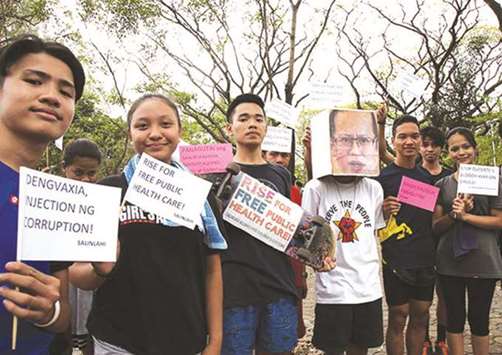Malacanang has appealed to the public not to let the controversy over Sanofi Pasteur’s controversial Dengvaxia dengue vaccine stop them from getting their children vaccinated against other diseases.
In an interview, Palace spokesman Harry Roque Jr reiterated that not all vaccines are harmful and that parents should not place their children at risk by depriving them of protection against other diseases.
“What the government suspended was the Dengvaxia vaccine. All other vaccines that have been in use for a long time will continue,” Roque said.
“Our appeal to all mothers, fathers, please continue to let your children be vaccinated because all existing vaccines have been used for a long time. If you stop taking vaccines, there could be more risk to the health of your children,” he added.
Procured in 2016, Dengvaxia was administered to about 837,000 people under a national immunisation programme, mostly public school students in areas where dengue was reportedly prevalent.
The Department of Health (DoH) last year halted its dengue vaccination programme after Sanofi’s admission that Dengvaxia could lead to more severe symptoms if given to those who have not had the mosquito-borne disease before.
It demanded a full refund but was rejected by Sanofi. The government is planning to sue the French pharmaceutical giant.
The Public Attorney’s Office had claimed its forensics experts found a pattern in the deaths of at least 18 children who received Dengvaxia during the Aquino administration.
President Rodrigo Duterte earlier said he believed the previous administration implemented the controversial dengue immunisation programme in good faith. Duterte said he would have done the same thing, provided there was a vaccine available that could help Filipinos fight the deadly disease.
In Legazpi City, Health Secretary Francisco Duque said the Dengvaxia controversy was the saddest chapter in the history of the country’s public health system, but vowed to rise above the challenges to win back the trust and confidence of Filipinos in government’s vaccination programmes.
Duque admitted in a news briefing at the Bicol Regional Training and Teaching Hospital that the Health department was suffering a setback temporarily because of the Dengvaxia mess.
He said about 5mn people might succumb to illnesses especially the children if they did not undergo vaccination.
“Next to water, vaccination is very important as it curbs diseases and saves lives. Health and education is a driver of development. That’s why we are urging and praying to win back the trust and confidence of the people for them to believe in the vaccination programme,” the country’s top health official said.
Duque also told health authorities and personnel on the ground to continue to woo the parents for their children to undergo vaccinations against dengue, measles, pneumonia and other related preventable diseases to save lives.
“To parents, bring your children to health centres for vaccination. Bring back your trust to our programme,” he said.
“To health workers, don’t stop and as much as possible woo the parents for them to co-operate, because we will be facing difficulties just in case an outbreak occurs. We will be lacking hospitals and physicians if this happens because of the Dengvaxia scare,” Duque said. He said measles is a vaccine-preventable disease.
Asked by Manila Times how the Dengvaxia mess was hurting the DoH and affecting the sustainable development goals of the government, Duque said: “The Dengvaxia is ‘a class of its own.’ This is the first incident in the history of the Department of Health when we have mass vaccination using for the first time a new vaccine.”
“But we’re not helpless somehow; we withstood the test of time as we are now able to level up our response to Dengvaxia. But if you look at the statistics, the Dengvaxia vaccine is 66% effective and the case fatality ratio over the number of those vaccinated with anti-dengue is less than 10%,” the Health chief said.

Relatives of children inoculated with Dengvaxia amplify their call for the prosecution of officials behind the controversial anti-dengue vaccination programme during a rally at the Quezon City Memorial Circle.
